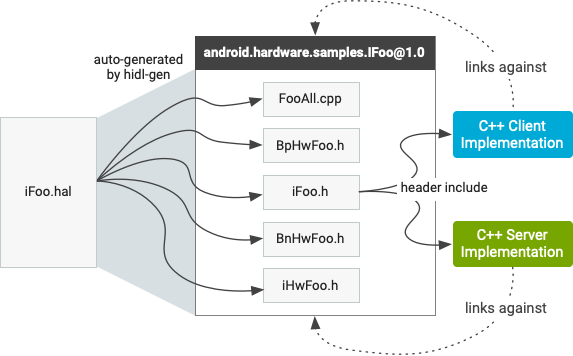With few exceptions, HIDL interface packages are located in
hardware/interfaces or the vendor/ directory. The
hardware/interfaces top-level maps directly to the
android.hardware package namespace; the version is a subdirectory
under the package (not interface) namespace.
The hidl-gen compiler compiles the .hal files into
a set of a .h and .cpp files. From these autogenerated
files a shared library that client/server implementations link against is built.
The Android.bp file that builds this shared library is
autogenerated by the hardware/interfaces/update-makefiles.sh
script. Every time you add a new package to hardware/interfaces, or
add/remove .hal files to/from an existing package, you must rerun
the script to ensure the generated shared library is up-to-date.
For example, the IFoo.hal sample file should be located in
hardware/interfaces/samples/1.0. The sample
IFoo.hal file creates an IFoo interface in the
samples package:
package android.hardware.samples@1.0; interface IFoo { struct Foo { int64_t someValue; handle myHandle; }; someMethod() generates (vec<uint32_t>); anotherMethod(Foo foo) generates (int32_t ret); };
Generated files
Autogenerated files in a HIDL package are linked into a single shared
library with the same name as the package (for example,
android.hardware.samples@1.0). The shared library also exports a
single header, IFoo.h, which can be included by clients and
servers. Using the hidl-gen compiler with the IFoo.hal
interface file as an input, binderized mode has the following autogenerated
files:

Figure 1. Files generated by compiler.
IFoo.h. Describes the pureIFoointerface in a C++ class; it contains the methods and types defined in theIFoointerface in theIFoo.halfile, translated to C++ types where necessary. Doesn't contain details related to the RPC mechanism (for example,HwBinder) used to implement this interface. The class is namespaced with the package and version, for example,::android::hardware::samples::IFoo::V1_0. Both clients and servers include this header: Clients for calling methods on it and servers for implementing those methods.IHwFoo.h. Header file that contains declarations for functions that serialize data types used in the interface. Developers should never include his header directly (it doesn't contain any classes).BpHwFoo.h. A class that inherits fromIFooand describes theHwBinderproxy (client-side) implementation of the interface. Developers should never refer to this class directly.BnHwFoo.h. A class that holds a reference to anIFooimplementation and describes theHwBinderstub (server-side) implementation of the interface. Developers should never refer to this class directly.FooAll.cpp. A class that contains the implementations for both theHwBinderproxy and theHwBinderstub. When a client calls an interface method, the proxy automatically marshals the arguments from the client and sends the transaction to the binder kernel driver, which delivers the transaction to the stub on the other side (which then calls the actual server implementation).
The files are structured similarly to the files generated by
aidl-cpp (for details, see "Passthrough mode" in the
HIDL Overview). The only
autogenerated file that is independent of the RPC mechanism used by HIDL is
IFoo.h; all other files are tied to the HwBinder RPC mechanism used
by HIDL. Therefore, client and server implementations should never
directly refer to anything other than IFoo. To achieve
this, include only IFoo.h and link against the generated shared
library.
Link to shared libraries
A client or server that uses any interface in a package must include the shared library of that package in one (1) of the following locations:
- In Android.mk:
LOCAL_SHARED_LIBRARIES += android.hardware.samples@1.0
- In Android.bp:
shared_libs: [ /* ... */ "android.hardware.samples@1.0", ],
Additional libraries you might need to include:
libhidlbase |
Includes standard HIDL data types. Starting in Android
10, this also contains all of the symbols previously in
libhidltransport and
libhwbinder.
|
|---|---|
libhidltransport |
Handles the transport of HIDL calls over different RPC/IPC mechanisms. Android 10 deprecates this library. |
libhwbinder |
Binder-specific symbols. Android 10 deprecates this library. |
libfmq |
Fast Message Queue IPC. |
Namespaces
HIDL functions and types such as Return<T> and
Void() are declared in namespace ::android::hardware.
The C++ namespace of a package is determined by the package name and version.
For example, a package mypackage with version 1.2 under
hardware/interfaces has the following qualities:
- C++ namespace is
::android::hardware::mypackage::V1_2 - Fully qualified name of
IMyInterfacein that package is:::android::hardware::mypackage::V1_2::IMyInterface. (IMyInterfaceis an identifier, not part of the namespace). - Types defined in the package's
types.halfile are identified as:::android::hardware::mypackage::V1_2::MyPackageType
